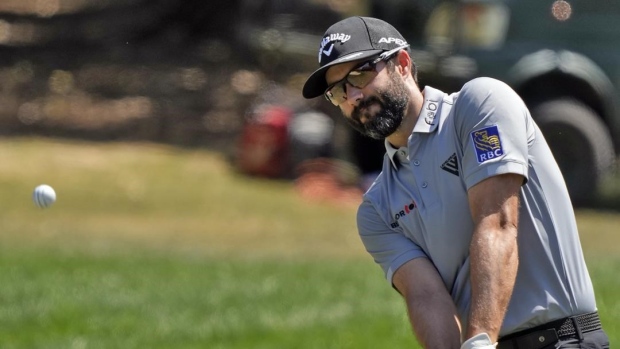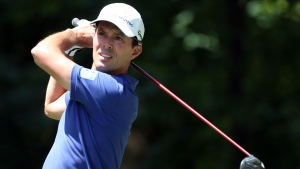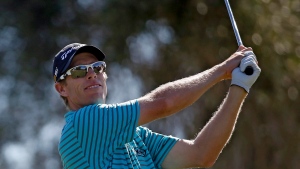Jun 9, 2022
How a Canadian can win the Open
Six Canadians who've come close to winning their national championship offer advice on how the 68-year drought might end this year. Bob Weeks has more from St. George’s Golf and Country Club in Toronto.
By Bob Weeks

Every Canadian in this week’s field at the RBC Canadian Open knows the number – 68. That’s how many years it’s been since a native son has won the national championship.
They also know that the guy who did it was Pat Fletcher, even if none of them would recognize a photo of the golfer who spent time as the professional at Saskatoon Golf and Country Club and later the Royal Montreal Golf Club.
And they also want nothing more than to end this drought, if for no other reason than to stop the one question they face every year: When will a Canadian win the Open?
Over the past 67 years, a number of Canadians have come close to winning. They’ve missed by a shot here or a putt there, breaking the hearts of fans from coast to coast who had to watch as another foreigner hoisted the trophy yet again.
With this year’s return of the PGA Tour event – the COVID-19 pandemic led to its cancellation in 2020 and 2021 – I reached out to a half-dozen Canadian players who came oh-so-close to winning the Open. I asked them about the experience and to glean some advice that might help this year’s field, arguably as deep and talented a group of Canadians as there has ever been, as they prepare to take on St. George’s Golf and Country Club in Toronto.
Richard Zokol, 1987
Zokol was playing the Canadian Open for the 12th time when he arrived at Glen Abbey in 1987. His game was solid, and he felt as though a breakout was close. That showed over his first three rounds as he posted 70-68-69. That left him tied for the lead with Curtis Strange and Richard McCullough.
But as the final round got underway, the hopes of ending the dry spell evaporated quickly.
“I wasn’t prepared to handle that final round,” recalled Zokol who was paired with Strange. “I was standing on the first tee, and I knew I wasn’t going to win. And Curtis knew I wasn’t going to win. And Curtis knew that I knew I wasn’t going to win.”
Strange shot 69 to cruise to the win and Zokol ended up with a 75 and tied for seventh.
“Curtis just cruised past us,” Zokol stated. “He was a stone-cold killer, in the golf sense.”
Always a big proponent of the mental side of the game, Zokol said that any Canadian who gets in the hunt will need to stay focused.
“Do not project forward what may or may not happen,” he stated. “Rely on your pre-shot routine and properly process every shot that got you into that position.”
Above all, Zokol said, it’s important to do whatever it takes to be as comfortable as you can.
“Embrace the struggle,” he said.
Dave Barr, 1988
Dave Barr may have had the longest wait to see if he would win the Canadian Open. In the final round at Glen Abbey, Barr fired a 66 and took the clubhouse lead just as a massive storm hit the Oakville, Ont., area forcing a suspension of play. The last group still had six holes remaining and wouldn’t complete it on Sunday.
“I didn’t think I had any chance,” said Barr. “There were some pretty good players out there and I wasn’t leading by that much.”
But those odds got much better when he woke up the next morning and the temperature dropped by 10 degrees, turning what had been a sweltering Sunday into a frigid Monday with a completely different wind direction. Scott Verplank, one of those still on the course, remarked that the surprise weather change forced him to adjust his wardrobe.
“I think I put on every piece of clothing I had with me,” he said.
Seeing how the elements would make things difficult, Barr went out to Glen Abbey to await the outcome and see if Mother Nature was on his side.
“I would say it was still a long shot, but I thought there was definitely a better chance than a day earlier,” said Barr.
Three players eventually finished with better scores than Barr, with Ken Green’s being the best.
As a guide for those Canadians in this year’s event, Barr said that preparation and determination are the keys.
“I think you have to hope your game is good and then to try and prepare for the week as you would a normal event,” said the Canadian Golf Hall of Famer. “It’s easy to get pulled in different directions that you’re not used to.
“And you have to embrace the fans. They sometimes want a Canadian to win more than the player does, so it can be a lot.”
Using the cheers to your advantage, then, is a must for any homebody hoping to finish on top on Sunday.
Mike Weir, 2004
 The closest any Canadian has come to winning the Open since ’55 was Mike Weir in 2004. That’s not surprising considering Weir was a year removed from his Masters win and knew what it was like to win on home soil. He captured the 1999 Air Canada Championship in Vancouver for his first PGA Tour win.
The closest any Canadian has come to winning the Open since ’55 was Mike Weir in 2004. That’s not surprising considering Weir was a year removed from his Masters win and knew what it was like to win on home soil. He captured the 1999 Air Canada Championship in Vancouver for his first PGA Tour win.
Weir was arguably Canada’s highest-profile athlete in 2004, thanks to that Green Jacket and his four PGA Tour wins over the previous year. He came into the final round at Glen Abbey Golf Course atop the leaderboard and the fans sensed he was going to get it done.
“I remember the excitement of the crowd,” said Weir. “It was like a hockey crowd, they were chanting and running to get into position on every shot. It was nuts, really.”
Bell, the sponsor of the tournament and of Weir, amped things up by handing out thousands of hats similar to the one Weir wore. The crowd yelled and cheered, they sang O Canada, and they did everything but drag their guy across the finish line.
Coming to the 18th hole, Weir was tied with Vijay Singh, who was the No. 1 player in the world at the time. The Canadian had a birdie putt to win it but it turned right at the hole and wouldn’t drop.
Singh and Weir headed back to the 18th tee for the playoff but couldn’t decide anything. At the 17th, Weir missed another opportunity to win when his putt just missed the cup.
On the second playoff try at the 18th, Singh, who had already won six times that year, dashed Weir and much of Canada’s hopes with a birdie.
“I feel like I spoiled the party,” Singh said in his post-round comments. “I know Mike really wanted to win this.”
This week, as he tees it up for the 29th time in his national championship, Weir’s advice to Canadian golfers trying to go one better than him is blunt.
“Don’t forget to breath a lot,” said Weir. “I know that sounds crazy but it’s easy to get amped up and get ahead of yourself. You need to walk slow and stay as calm as you can. You also need to embrace it and use the crowd to your advantage.”
As the only Canadian male to win a major, Weir said the challenge for a Canadian to win at home is not unlike trying to grab the laurels at the Masters.
“It’s a similar feel, very similar,” he offered.
While that’s a tall task, Weir believes the talent is there to take one more step than he did.
“There’s no doubt that we have four or five guys who can win this. I think they’ll need to putt really well. St. George’s is going to be a course where you’ll need to go low.”
Adam Hadwin, 2011
Adam Hadwin was still playing PGA Tour Canada when he got himself into contention at the RBC Canadian Open at Shaughnessy G&CC. He might have been in over his head with the depth of talent on the PGA Tour, but it didn’t show.
The Abbotsford, B.C., product put together rounds of 72-66-68 and was just a shot behind Bo Van Pelt heading to Sunday. The final round didn’t start so well. Hadwin was five over through his first 10 holes and appeared out of contention, but the fans weren’t having any of it.
“Biggest thing to me was the crowd and how behind me they were,” Hadwin recalled. “I struggled early but I started making a few birdies on the back and I remember the putt I had on 14. It was 30 feet; it went up over the ridge and down and in. It was one of the loudest roars I’ve ever heard.”
He made birdies on 12, 13 and 14 but couldn’t catch the lead pack.
“It was very, very special – a really cool feeling,” stated Hadwin. “I remember walking up 18 and the fans were singing the national anthem. I had chills the entire time.”
He finished tied for fourth, posting the first top 10 of his career.
When it comes to trying to find the key to a Canadian getting to the winner’s circle, Hadwin says that task is a tall one.
“You’re asking a player to peak for one event when you’re playing against the best players in the world,” he said. “You talk to any one of us competing at any other event, whether it’s the Travelers or the John Deere or a major. We have to be on top form to do that so to go to someone and say ‘You need to be in top form this specific week’ is a very difficult thing to do. We all want to start peaking around that time. But it’s difficult to win out here.”
Even with that, Hadwin believes the drought will end.
“It’s going to happen,” he said. “I think we all believe it will. I don’t know where. I don’t know how but it’s going to happen at some point.”
David Hearn 2015
 David Hearn came to Glen Abbey after missing the cut at the Open Championship. Although he’d had a few good finishes prior to that, there was nothing on his record that indicated he was about to make a run at winning his national championship. At least, that’s how it appeared on the outside.
David Hearn came to Glen Abbey after missing the cut at the Open Championship. Although he’d had a few good finishes prior to that, there was nothing on his record that indicated he was about to make a run at winning his national championship. At least, that’s how it appeared on the outside.
Hearn knew his game was on track and that some good golf was ready to blossom.
“I was playing really well and came in with a lot of confidence and a calm about things,” said Hearn. “I guess you can call it being in the zone.”
After three rounds, Hearn led the tournament by two shots and the hope for a drought-ending Sunday was genuine.
On Saturday night, Hearn went back to the house where he was staying and enjoyed a meal with friends and didn’t feel any pressure. Unlike past times when he was heading to Sunday with a chance to win, he was calm and had no trouble going to sleep.
“When I went out on Sunday, I really felt positive, as if I was going to get it done,” he stated. “In fact, I was kind of surprised I didn’t get it done.”
Despite starting the final round with two birdies, Hearn couldn’t keep pace with Jason Day, who posted a final-round 68 to capture the title. Bubba Watson edged Hearn for second place, one shot back of Day.
“It was funny but on Sunday night, I couldn’t get to sleep,” recalled the Brantford, Ont., product. “I kept thinking about the things I could have done.”
Hearn will be in the field for this week’s tournament, trying to re-kindle his form from 2015. For the others, he says the key is to embrace things.
“The fans are always loud and supportive,” he said. “You want to make it happen for them, but you can try too hard. You just need to focus on your game.”
Jared du Toit, 2016
One of the most stunning performances by a Canadian in the Open came in 2016 when 21-year-old Jared du Toit, an amateur, found himself in the last group on Sunday alongside Brandt Snedeker.
A final-round 71 wasn’t good enough as the leaders all went deep into red figures, especially eventual champion Jhonattan Vegas, whose Sunday 64 allowed him to earn top spot. Du Toit ended up finished tied for ninth.
“It’s kind of wild to think about it now,” said du Toit, who is playing on PGA Tour Canada. “It feels like a long time ago even though it isn’t that long ago.”
His goal was to make it to the weekend, which he did with flying colours, shooting rounds of 67-71. On Saturday, he eagled the 18th hole for a round of 70 that put him into that last tee time.
“I was probably too nervous to have threatened to have won the tournament,” he admitted. “I kind of got lapped by the guys in front of me.”
Still the experience and feeling the massive crowd support was a memory that hasn’t faded.
“I couldn’t have asked for anything better than maybe to have been professional and accepted some money,” he said
As for help for any Canadian who finds himself in a similar position, du Toit said shutting out the loud noise around you is imperative.
“Don’t watch SportsCentre,” he laughed. “I was watching the (NHL) playoffs and all of a sudden, I’m on there and that added more stress to it.”
